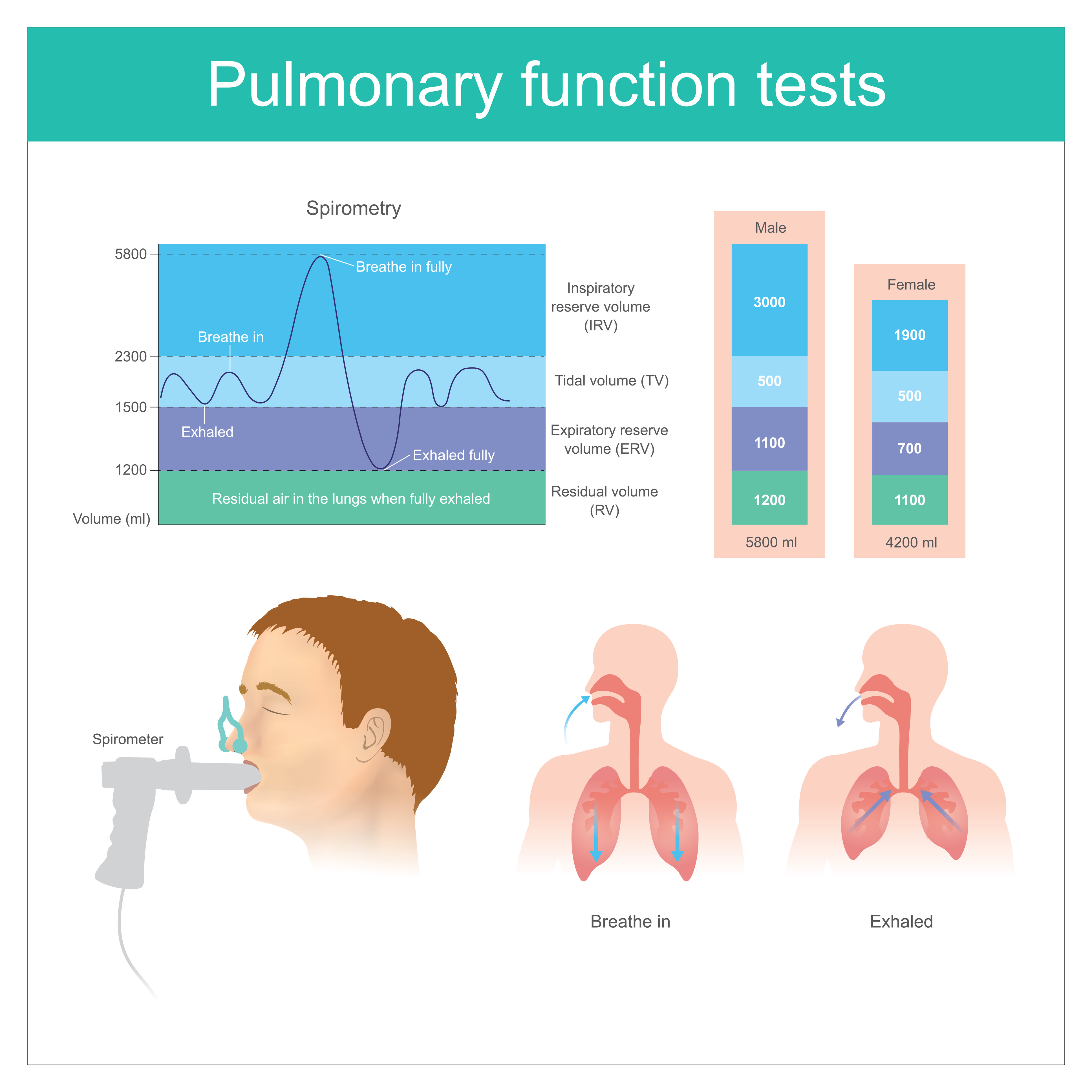Pulmonary function tests (PFT)
When you see your doctor because you’re having trouble breathing, they may recommend pulmonary function testing to diagnose your condition or determine what kind of treatment you might need.
There are many tests that measure different things about the way you breathe. Depending on your symptoms, your doctor may order one or a combination of lung function tests.

Types of pulmonary function tests
The most common pulmonary function test (PFT) is spirometry. Spirometry testing measures the volume of air you inhale and exhale during a breath. It also measures how fast the air moves when you blow out and how much effort it takes. Spirometry testing is done in your doctor’s office or at a separate lab.
Some other common respiratory function tests are:
- Lung volume: Measures how much air you can hold in your lungs and how much air remains after you exhale. This is also called body plethysmography.
- Diffusing capacity: Measures how well oxygen moves from your lungs to your blood.
- Fractional exhaled nitric oxide: Measures amount of nitric oxide exhaled. Can help diagnose and manage asthma.
- Exercise stress test: Measures how your lung and heart functions are affected while you exercise, usually on a stationary bike or treadmill.
Other tests that may be ordered include X-rays, bronchoscopy and endobronchial ultrasound (EBUS). You may have an arterial blood gas (ABG) test to measure levels of oxygen and carbon dioxide in your blood. Your pulmonary function test results provide a complete look at your lung health.
Talk to your doctor if you have any concerns or questions about the tests they’ve recommended.
Contraindications for exercise stress testing
Exercise stress testing won’t be ordered for people who have:
- Had a stroke or heart attack in the last three months
- Large aneurysm of a major blood vessel
- Major head injury
- Recent eye surgery
- Confusion
Why do doctors order these tests?
Doctors order pulmonary function testing for a variety of reasons. Initially, they’re ordered to help diagnose your condition when you report symptoms such as difficulty breathing, excessive coughing or wheezing. Your doctor gathers information to plan your treatment.
After your diagnosis, your doctor will periodically order evaluations to check whether treatment is working and monitor your condition.
When you’re about to have abdominal or lung surgery, your doctor may check your pulmonary function test results to see if your lungs are healthy enough for surgery.
Tests may also be used to determine whether you have lung damage because of exposure to chemicals in the home or on the job.
Conditions diagnosed by pulmonary function tests
When your doctor or specialist comes to a diagnosis, they may classify your condition as either obstructive or restrictive.
Obstructive conditions like bronchitis, emphysema and asthma narrow the pathways in your lungs.
Restrictive conditions like pulmonary fibrosis, sarcoidosis and scleroderma keep your lungs from expanding enough, so you can’t inhale enough oxygen for your entire body.
Some of the many diseases and conditions that may require different kinds of lung function testing are:
- Asthma
- Allergies
- Chronic obstructive pulmonary disease (COPD)
- Damaged or scarred lung tissue
- Sarcoidosis – damages cells around your lungs
- Lung cancer
- Infections
- Thickened, stretched or enlarged airways
- Scleroderma – thickening or hardening of the connective tissues
- Pulmonary fibrosis
- Abnormal lung X-ray findings
Side effects from lung function tests
Respiratory function tests have very few risks and they aren’t painful. You may feel dizzy or lightheaded during the test. Or you may feel a little claustrophobic.
Are you at risk for lung cancer?
Lung cancer is the leading cause of cancer death in the U.S. Our lung health quiz identifies your risk of lung cancer and gives you an idea of what to do next based on your results.
Get care
We help you live well. And we’re here for you in person and online.
